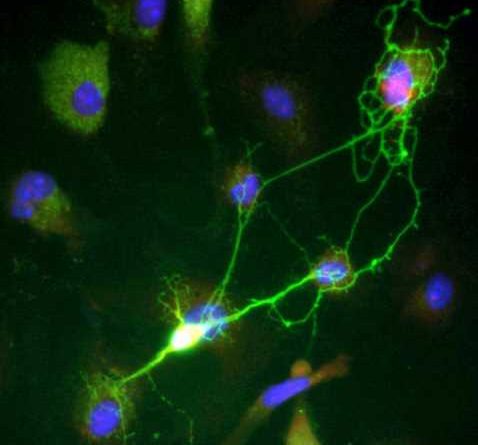Study explores how endocannabinoids regulate brain’s response to stress

Investigators have identified new signaling mechanisms utilized by endocannabinoids to regulate a subset of neurons in response to stress, according to findings published in the Proceedings of the National Academy of Sciences.
The study, led by Sachin Patel, MD, Ph.D., chair and the Lizzie Gilman Professor of Psychiatry and Behavioral Sciences, improves the understanding of how stress and anxiety affect motivation and may also offer insight into mechanisms underlying the rewarding effects of cannabis.
In the current study, investigators studied a subset of neurons in the brain’s reward circuit located within the nucleus accumbens, a part of the ventral striatum that is essential for regulating motivation, action and reward.
This subset of neurons contains the neuropeptide somatostatin as a genetic marker. Little is known about somatostatin neurons, but previous work suggests they help orchestrate reward effects from certain drugs and may also reduce anxiety, according to Patel.
The body’s endocannabinoid system is composed of endogenous cannabinoids (endocannabinoids), which are neurotransmitters that bind to cannabinoid receptors located throughout the nervous system and regulate synaptic transmission in the nucleus accumbens and many other areas of the brain.
The mechanisms cannabinoids employ to regulate intercommunication between somatostatin neurons, however, haven’t been established, according to Patel.
“We were interested in trying to understand how cannabinoids regulate the activity of these neurons because it seemed like they play an important role in regulating two things that cannabinoids are heavily involved in, which are motivation and anxiety,” Patel said.
Using electrophysiology to track neuronal activity in brain slices from mice, the investigators found that when cannabinoid receptors were activated, the activity of the somatostatin neurons increased. The activation of these cannabinoid receptors also enhanced singling from the hippocampus, thereby promoting the activity of the somatostatin neurons.
“There’s sort of a two-pronged effect: when cannabinoids receptors are activated in this reward circuitry, it changes the inputs in a way that promotes activity of these cells and then it has a direct effect on the somatostatin cells themselves to increase the number of action potentials they fire,” Patel said.
The investigators also found that stress exposure activates somatostain neurons within the nucleus accumbens and produced long-term increases in the excitability of these cells, mimicking these “two-pronged” mechanisms used by cannabinoids.
They then demonstrated these effects of stress were indeed mediated by the release of endocannabinoids, providing new insight into the mechanisms by which stress exposure may produce persistent effects on motivation and anxiety.
“It might provide some mechanistic insight into how cannabinoids might be doing both of those things, and it might be through activation of this small population of neurons,” Patel said.
The findings may also provide more clarity into the pathophysiology of stress-related disorders such as depression and post-traumatic stress disorder, according to Patel.
According to Patel, his team is now interested in using behavioral approaches to understand how these neurons are regulating both reward and anxiety, as well as understanding how cannabinoids are affecting the excitability of these cells on a molecular level.
More information:
Veronika Kondev et al, Synaptic and cellular endocannabinoid signaling mechanisms regulate stress-induced plasticity of nucleus accumbens somatostatin neurons, Proceedings of the National Academy of Sciences (2023). DOI: 10.1073/pnas.2300585120
Journal information:
Proceedings of the National Academy of Sciences
Source: Read Full Article



